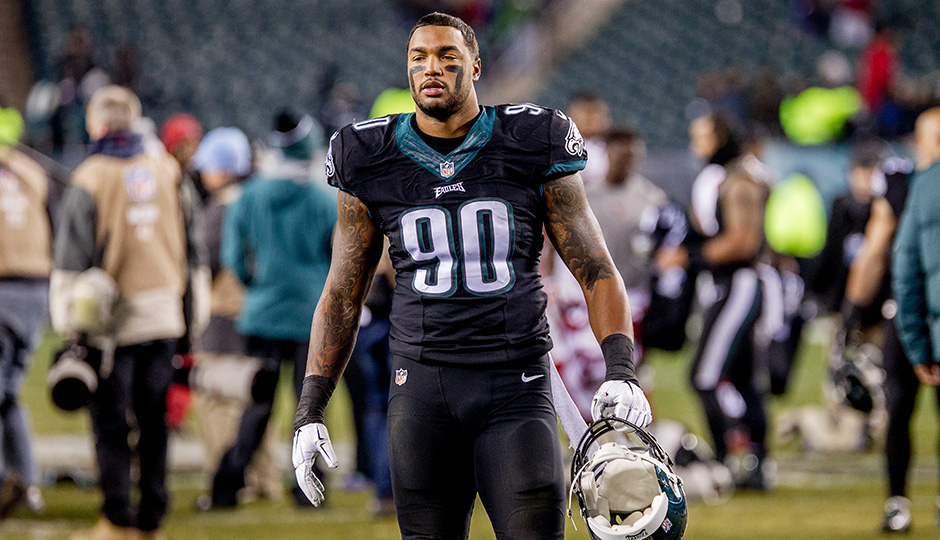Marcus Smith: ‘I Don’t Think There’s A Gap’
Marcus Smith picked up a half-sack in the Eagles’ 40-17 loss to the Cardinals in Week 15. For most first-round draft picks playing in their second season in the league, that would be an encouraging, albeit run-of-the-mill, tick in the box score.
For Smith, it was the first time he recorded even half a sack in his career.
After two seasons, Smith has shown few signs that he is close to stepping into any sort of consistent defensive role on this team.
“Marcus has got to continue to get better,” Billy Davis said Tuesday. “There hasn’t been a whole lot of production yet. We’re still working, Marcus is working hard at it, and hopefully we can get some production from him.
“You have to play the guys that are playing the best for you. If there’s too big of a gap, the other guys can’t play. Right now, it’s tough to take [Connor Barwin] or [Brandon Graham] off and put Marcus on.”
But that’s not how Smith sees it.
After Tuesday’s practice, Smith was asked at his locker if he felt the gap between his game and Barwin and Graham was something he could close and overcome next season.
“I’m not really sure what you mean as far as a gap,” Smith said. “I don’t think there’s a gap in between [us]. I feel like I can play up to that ability, and I feel like I can be a playmaker when the time is needed.”
Smith said he expected to see more defensive snaps this season than the 92 he’s seen so far.
“I want to be out there, I want to be doing the things … everybody wants to play more,” Smith said. “Of course, if you’re out there more, you’re going to make more plays. Me being out there would be telling for me to make more plays.”
Graham, another first-round pick from a Power 5 school, had an underwhelming first two seasons of his career as well, and he said Tuesday he understands what Smith is going through.
“It’s for him to really go out this offseason, come back, like I tell him, come back jacked,” Graham said. “Not on some illegal stuff, but just go work. Because you know what you’re supposed to be doing. You got a taste. It’s just like college. Your first two years are a little rough. By your junior year, they should be saying your name. I’m hoping it’ll be the same for him.”
Graham said he feels like a sort of mentor for the younger Smith, and that the second-year linebacker understands how important this offseason in terms of seeing future success.
However, the evidence in Graham’s first two seasons was much stronger than what Smith has compiled in his first two years.
Smith has played extremely sparingly in his first two seasons, recording just two tackles, two assists, and 0.5 sacks so far.
Graham, for comparison, had forced two fumbles and picked up three sacks in his first year to go along with 12 tackles. His second year was hampered by injuries, but he still added five tackles, three more than Smith’s entire career has yielded.
Regardless, Smith said he wants to remain in Philadelphia, in part because of a desire to make good on the commitment the Eagles made when they drafted him.
“This is where I want to be,” Smith said. “This is the team that drafted me, and I want to make the best of me being here.”
Graham thinks Eagles need to be held accountable
Earlier this season, Malcolm Jenkins accidentally made waves by saying the Eagles needed to be held more accountable for mistakes, inadvertently implying that Chip Kelly‘s coaching methods were inadequate and possibly responsible for the Eagles’ inconsistent third season under their head coach.
On Tuesday, Graham, disappointed with the playoff-less end to the season, said he agreed with Jenkins’ viewpoint on accountability in the organization.
“I just think we all need to hold ourselves accountable each week,” Graham said. “Hold each other accountable, and become more of a … I guess I’m rolling with [Jenkins] on it. We’ve got to criticize each other a little more, as far as when stuff ain’t right. Just light fires under people, instead of just brushing it under.
“We can learn to criticize without … just be able to take constructive criticism. And not saying we can’t, but we need more of it. That’s it. Just more.”
